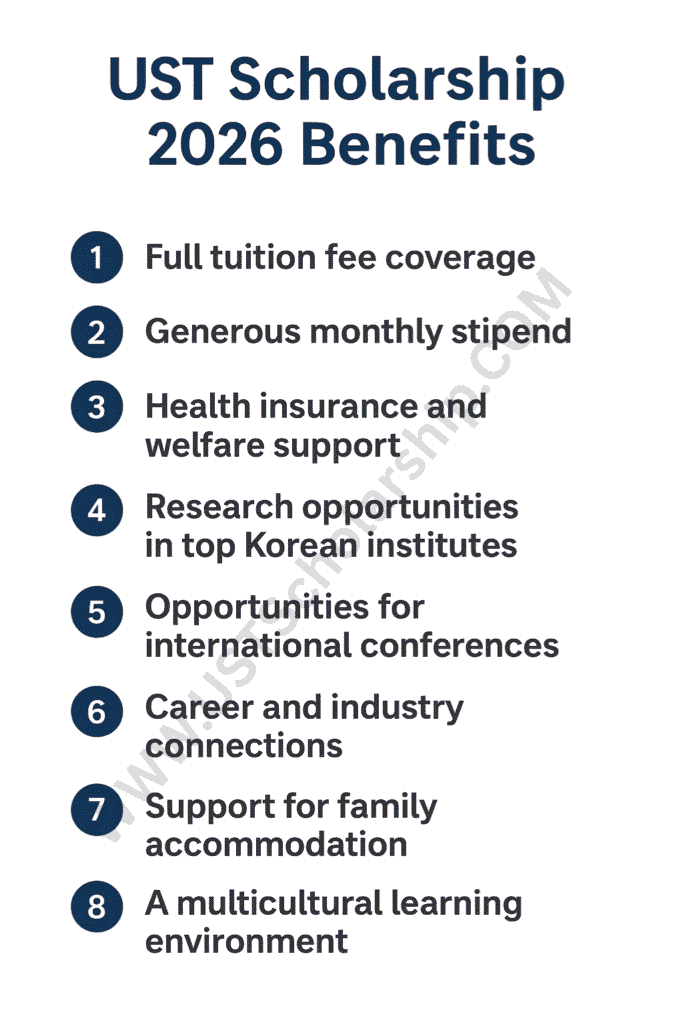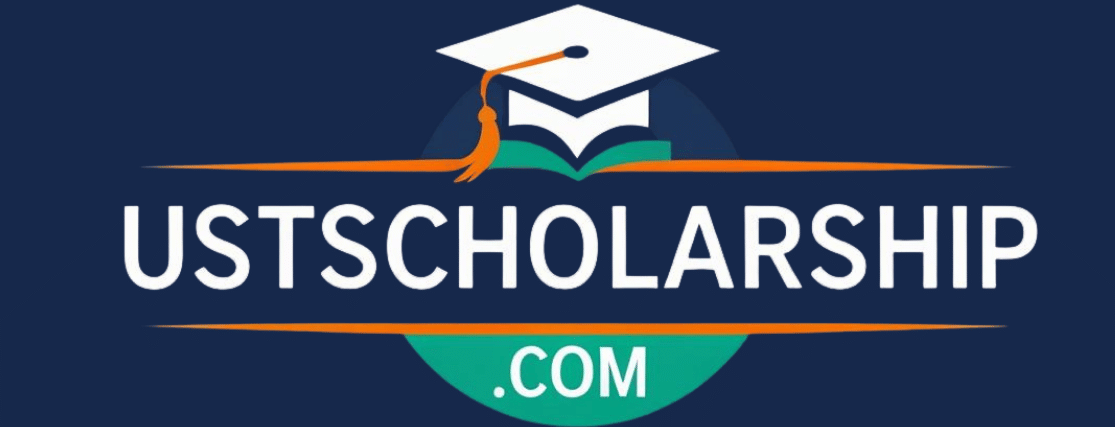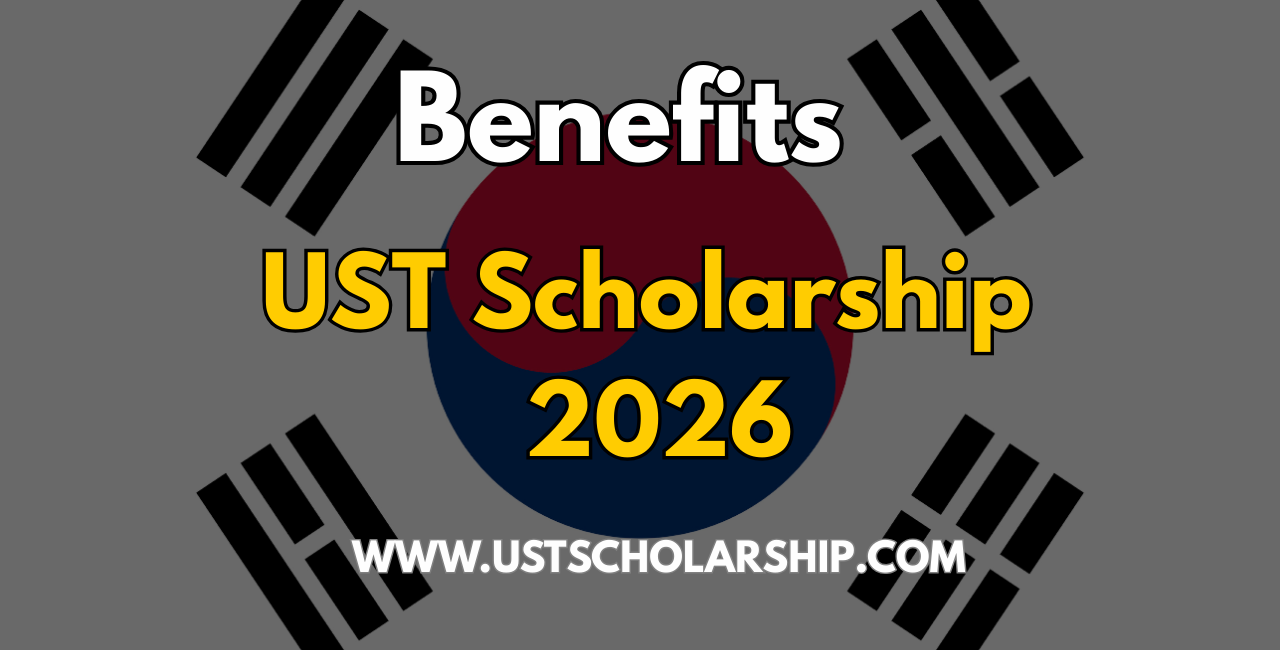This guide explains every major benefit of the UST Scholarship 2026. It covers tuition, monthly stipend, health insurance, research access, conference support, and career outcomes. You also get a clear budget view so you can plan life in Korea. Use this page to see the full value before you apply.
What UST covers (Benefits)
- Full tuition for the whole degree period
- Monthly stipend paid to your bank account
- National health insurance for enrolled students
- Access to government research labs and facilities
- Academic support from your institute and lab
- Possible support for conferences and presentations
- Student services for housing and campus life
All points below are based on recent cycles. Exact terms can vary by institute and year.
1. Tuition coverage
UST waives full tuition for Master’s, PhD, and integrated tracks. No separate course fees apply for standard enrollment. Special training or external certification fees, if any, are not part of the waiver unless noted by your institute.
2. Monthly stipend
UST provides a living allowance so you can focus on research. Amounts vary by program and institute. A typical range is around one thousand to twelve hundred US dollars each month for most students. The lab may also provide top-ups for project work or duties. The stipend is paid on a monthly schedule after you register your local bank account.
What affects the amount
- Program level
- Institute policy
- Lab project funding and performance
- Semester status and enrollment
Keep a two-month buffer for rent and setup when you arrive. Do not plan your budget to the last dollar.
3. Health insurance and care
Enrolled students are covered by national health insurance. It reduces the cost of common treatment and hospital visits. You may also get institute level support for checkups, mental health, and counseling. Always review the exact policy at orientation. Bring your previous records for any ongoing conditions so the clinic can guide you.
4. Research environment
UST is a network of government institutes. You work inside real labs with active projects. That brings you:
- Access to equipment and core facilities
- Mentorship from full-time researchers
- A chance to publish or file patents with the lab
- Collaboration with industry or national projects when available
You learn by doing. Your daily work happens in the lab you join. Read a few of their recent topics before you apply so your study plan fits what they do.
5. Conference and travel support
Many labs support conference fees and travel if you present accepted work. The rules differ by institute and budget. Your advisor decides the best path. Plan ahead:
- Target events that match your field
- Submit on time so the lab can process support
- Keep receipts and proof of acceptance
Even one solid conference gives you a strong line on your CV.
6. Language support and orientation
Several institutes run basic Korean classes for new students. The goal is simple life skills: transport, stores, housing, and campus tasks. These classes help you settle faster. They are not a replacement for degree classes which are often in English in STEM labs.
7. Housing options
Most new students start in dorm housing if available. Off-campus housing is also common near research zones.
- Dorms: lower rent, simple rooms, easy access to campus
- Off-campus: more privacy and choice, higher setup costs
Apply for a dorm as soon as you get the admission letter if you prefer campus housing. If you choose off-campus, arrive early to view rooms and sign legally. Do not send deposits before you see the place or confirm the contract terms.
Sample monthly budget
Use these ranges as a starting point. Costs depend on city and lifestyle. Dorm is usually cheaper than off-campus.
| Category | Low (USD) | Typical (USD) | High (USD) |
|---|---|---|---|
| Dorm housing | 180 | 260 | 350 |
| Off-campus housing | 350 | 500 | 700 |
| Food and groceries | 180 | 240 | 320 |
| Public transport | 25 | 40 | 60 |
| Mobile plan | 12 | 18 | 28 |
| Utilities if off-campus | 40 | 70 | 110 |
| Personal and study items | 40 | 70 | 120 |
| Leisure or other | 20 | 50 | 100 |
Download the editable planner:
UST 2026 Monthly Budget Planner (XLSX)
Adjust the “Typical” column to match your city and housing choice. Keep a small savings line each month for visa renewals, exams, and travel.
Academic support and training
You can expect regular meetings with your advisor and lab group. Many institutes offer:
- Safety training before you use equipment
- Short courses on methods and tools
- Writing and presentation workshops
- Career events and research seminars
Attend early. These sessions speed up your first paper and lab progress.
Career outcomes
UST trains you inside the national research system. After graduation students move to:
- PhD or postdoc positions
- National and global labs
- Tech and engineering roles in industry
- Startups that work with lab technology
Outcomes depend on your results, your advisor network, and your field. Build a small portfolio of real work: datasets, code, circuits, processes, or prototypes. Keep a clean project log from the first week.
Support for families
Some institutes allow married students to live with spouses. Family support policies vary. There may be no direct stipend for dependents. Check your housing policy early so you can plan. If you travel with family, add a cost buffer for visas, schools, and larger rooms.
What UST expects from you
Scholarships are renewed when you show progress. Common expectations include:
- Steady lab work and regular meetings
- Clean safety and ethics record
- A basic GPA threshold if your program uses graded courses
- Visible progress toward a thesis or publications
If you face a setback, inform your advisor early. Planning solves most issues before they grow.
Who thrives at UST
Students who do well tend to:
- Join a lab that matches their core skills
- Keep a clear weekly plan and lab notebook
- Ask for feedback on drafts and figures
- Learn one key method deeply so they add value fast
- Share results in group meetings and push one idea to completion
Fit matters. If your study plan matches the lab, the rest follows.
Myths and clarifications
“I can ignore English tests if I have MOI.”
Some institutes accept MOI. Others prefer IELTS or TOEFL. If you can add a score, it helps.
“The stipend alone covers any lifestyle.”
It covers student needs with care. Large apartments or daily meals out will exceed the budget.
“Papers are required before admission.”
Past papers help, but a strong plan and fit can win without them. Show skill, show focus, and show why your topic matters.

Related Posts:

